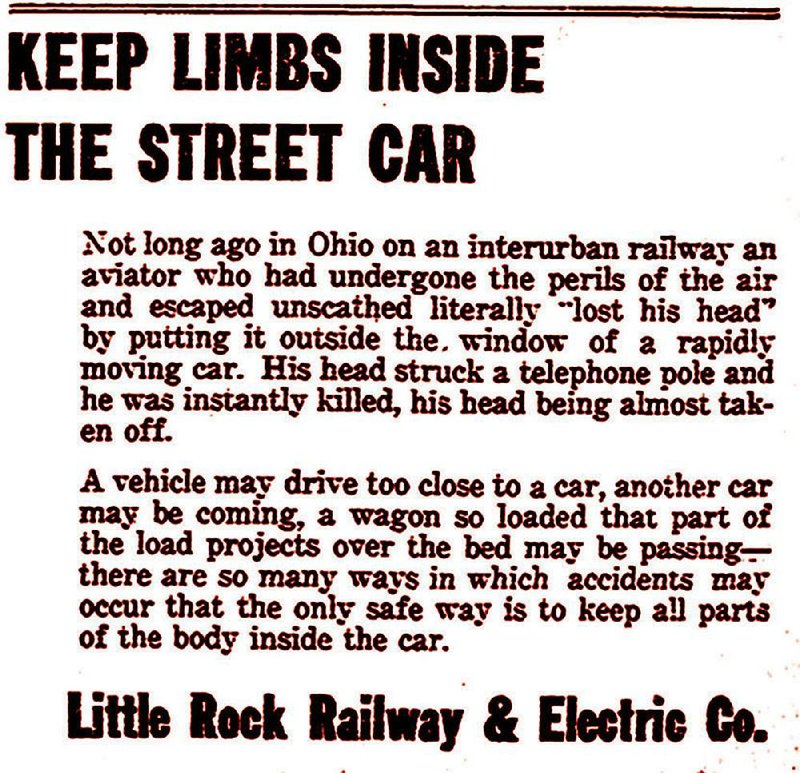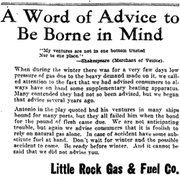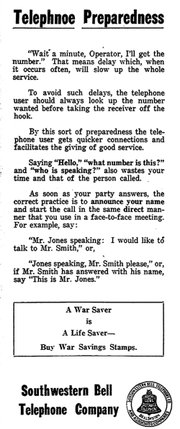Nobody likes a bossy business. We'd rather be the boss of our own selves, thank you very much. And if you know stuff that we don't even know we don't know, well, don't try to enlighten us by announcing that we don't know it.
Advice and instructions, which, yeah, maybe could save our lives, are nonetheless not our favored form of public messaging. We prefer commercial messengers who know their place -- or are willing to lie about how highly they rank ours.
"You decide." "Have it your way." "Our business is taking care of your business."
Reading advertisements in the archives of 100-year-old Little Rock newspapers, it appears that readers might have been a bit more humble in 1918. Either that or advertisers were more arrogant.
What else to make of notices that complain about their customers?
Take for example a caller-instruction campaign conducted in March 1918 by the Southwestern Bell Telephone Co. Sample ad, March 4 Arkansas Democrat:
"The Peak Load"
There are 128,000 originating telephone calls daily in the city of Little Rock.
13,000 of these are made between the hours of nine and ten o'clock in the morning.
These 13,000 calls form what we call the "peak load" and we must provide switchboard equipment and so adjust our operating force to handle this traffic at its highest rate.
The ad goes on to explain that this peak load offers a severe test for the poor telephone service, "which at this time is of such vital importance to the nation."
They don't have enough equipment because it's wartime.
Much switchboard equipment already has been diverted to government use in cantonments and camps and more will be required. There is now a scarcity of material and a scarcity of labor, making the "peak load" all the harder to handle.
As though anticipating that the receptive reader is wondering whatever he could do to help, the phone company says:
• Answer the telephone promptly.
• Look in the book before calling and make sure of the number.
• Avoid "as far as possible" making unnecessary calls, especially during the peak load.
• Speak clearly and distinctly, directly into the telephone, thereby avoiding the repetition of parts of the conversation.
Here is my favorite bit:
There are three parties to each telephone conversation: You, the operator and the party called. The co-operation of all three is necessary at the present time to assure high grade service for commercial use and for the national defense.
That's correct. By failing to shout clearly into your telephone mouthpiece, you are hurting your nation in a time of war.
Actually, that observation about conditions "at the present time" did prove to be correct. Today nobody has to cooperate with anybody to obtain great phone service.
Today, defensive readers might counter that equipment scarcity was understandable but even though the war had produced a famine of manpower, the phone company's operators were young women. And if it was having a problem recruiting young women, that might be because of the perceived unfair labor practices that had provoked a protracted strike at Fort Smith the year before.
Another ad in the campaign, from the March 13 Arkansas Gazette:
Saying "Hello," "What number is this?" and "who is speaking?" also wastes your time and that of the person called.
As soon as your party answers, the correct practice is to announce your name and start the call in the same direct manner that you use in a face-to-face meeting. For example, say:
"Mr. Jones speaking: I would like to talk to Mr. Smith," or
"Jones speaking, Mr. Smith please," or, if Mr. Smith has answered with his name, say "This is Mr. Jones."
DEATH BY STREETCAR
Another Bossy McBossyface wrote rather entertaining public notices for the city streetcar operator, Little Rock Railway & Electric Co. That guy dispensed advice, humor and cranial floggings. On March 14, 1918, the browbeating was relatively restrained.
Under the headline "Keep Limbs Inside the Street Car," he told a story about an accident that had happened in Ohio "not long ago" on an interurban railway. An aviator "who had undergone the perils of the air and escaped unscathed 'literally lost his head' by putting it outside the window of a rapidly moving car."
A vehicle may drive too close to a car, another car may be coming, a wagon so loaded that part of the load projects over the bed may be passing -- there are so many ways in which accidents may occur that the only safe way is to keep all parts of the body inside the car.
The more you know ...
I like the streetcar notices so much that one of these days we will have to reprint a bunch of them. And I am wondering, Helpful Historian, if you know who wrote them?
Here's another gem from the March 14, 1918, Gazette, this one a notice by your not obviously friendly neighborhood fuel provider, Little Rock Gas & Fuel Co., who, it is obvious, has attended an institution of higher learning.
Under the headline "A Word of Advice to be Borne in Mind," he begins with a quote from Shakespeare's The Merchant of Venice, to wit:
"My ventures are not in one bottom trusted
Nor to one place."
He then reminds the reader that during the winter there was, "for a very few days," low pressure of gas due to the heavy demand made on it. At that time, "we called attention to the fact that we had advised consumers to always have on hand some supplementary heating apparatus."
About here, the tone becomes defensive:
Many contend they had not so been advised, but we began that advice several years ago.
Then comes an explanation for the literary allusion. In Shakespeare's play, the character Antonio had his ventures in many ships bound for many ports, but they all failed him when the bond for the pound of flesh came due.
We are not anticipating trouble, but again we advise consumers that it is foolish to rely on natural gas alone. In case of accident have some substitute fuel at hand. Don't wait for winter and the possible accident to come. Be ready before winter.
Here's the best part, which I defy Dear Reader to find replicated in any nonironical utility company advertisement published today:
And it cannot be said that we did not advise you.
Things don't stay the same, and the more they change, the more they don't stay the same.
Email:
cstorey@arkansasonline.com
ActiveStyle on 03/12/2018


